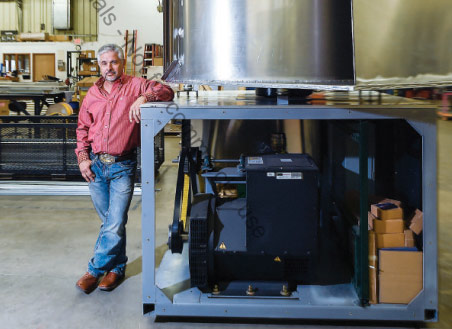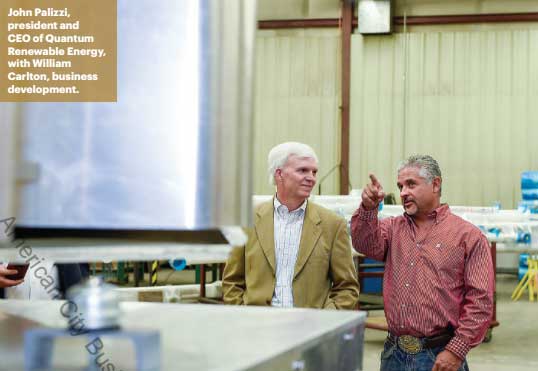THE NEXT BIG IDEAS:
Colorado’s pioneer spirit is alive and well among many metro Denver companies, and the Denver Business Journal invited them all to expand on their latest innovations—whether it was a new product, a better business process, a creative revenue stream, or unique software application. The sky was the limit. Quantum Renewable Energy was one of eight companies included as an intriguing “Next Big Idea.”

John Palizzi, president and CEO of Quantum Renewable Energy Inc., with the firm’s innovative wind turbine.Photo Courtesy of Denver Business Journal, Photo by Kathleen Lavine
Check out this exclusive article from Denver Business Journal featuring Quantum Renewable Energy, as written by Paula Moore.
Quantum Renewable Energy Inc. has figured out a way to use wind, solar and other types of renewable energy to generate power for clients in urban settings. The company builds rooftop power plants that not only produce the electricity needed by customers, but also excess power that can be sold back to a utility partner.
“We took a conventional wind turbine, examined how it worked, looked at inefficiencies, made some dramatic improvements on the location of the alternator and how it functions, and brought it into the urban corridor,” said John Palizzi, Quantum president and CEO. “We moved the alternator from the top to the bottom and got rid of the pole.”
Palizzi, who’s a licensed general contractor, got out of the construction market in 2004 and went into alternative energy the same year with the founding of Quantum. He had been interested in alternative energy since filling out the solar energy part of his general contractor’s licensing test back in the early 1990s. Quantum did research and development on its technology until 2009.
The renewable energy company employs five people in Colorado, three in metro Denver. It’s working on projects in Texas, Florida and New Jersey as well as Colorado.
Quantum, which has been funded mostly by Palizzi, did $750,000 in revenue last year, and anticipates 2016 revenue of about $3 million, according to the company.
Quantum’s core product is its American-made Warrior100 vertical wind turbine that produces utility-grade AC electricity within city limits. The turbine is part of an integrated system that also includes solar panels and a small natural gas-burning turbine. It even can think for itself, through a “brain” called Smart Box, to anticipate power loads and environmental conditions for the production of renewable energy. The box has a cloud-based monitoring and reporting system.

John Palizzi, president and CEO of Quantum Renewable Energy, with William Carlton, business development.Photo Courtesy of Denver Business Journal, Photo by Kathleen Lavine
“Nobody else has Smart Box… We developed algorithms [related to how much power a building will use],” said Palizzi. “Smart Box can know what a house or other building will use.”
The Quantum system was designed to “shave the peak,” or reduce the level of a customer’s peak power demand. The company estimates customers can save as much as 40 percent on their energy bills, “which translates to significant savings,” according to Quantum.
“We’re trying to educate people about wind power and getting financing to do it,” Palizzi said.
Customers have included the Eldora Mountain Resort LLC near Nederland, Centura Health Corp., Dish Network Corp. (Nasdaq: DISH), EchoStar Corp. (Nasdaq: SATS) and the Alliance for Sustainable Energy LLC.
The Denver Metro Chamber of Commerce installed a Quantum system in 2013 to cut its utility bills, and a few years later said it had seen a 25 percent drop. Tom Clark, chamber executive vice present, told the Denver Business Journal in 2015 that “you have to walk the talk” regarding renewable energy.
Palizzi was one of nearly 50 U.S. business leaders invited to the White House earlier this year to brief senior Obama Administration officials on how climate change affects businesses. The discussion, which coincided with the United Nations’ recent climate change agreement, focused on ways to curb the damaging effects of increasingly severe weather as well as efforts to make the U.S. the world leader in bringing clean energy products to market.
Discussing the briefing, Palizzi said in a statement that stronger clean energy standards would spur more clean energy technology research and development, and meet the goals outlined in United Nations climate change agreements. “I hope policymakers urge stronger clean energy standards to support a robust clean energy economy,” he said.






